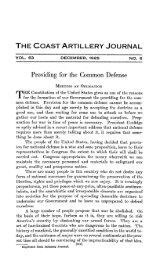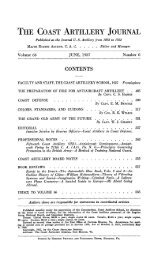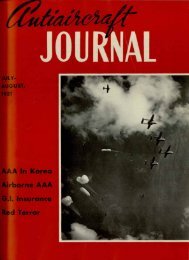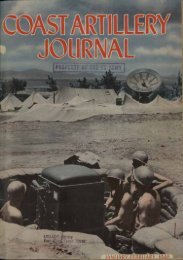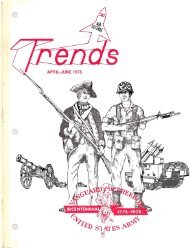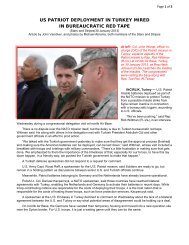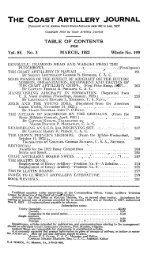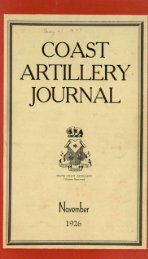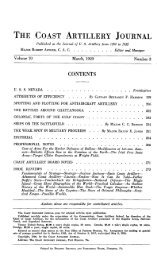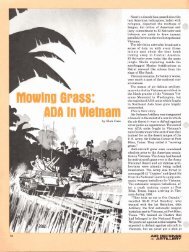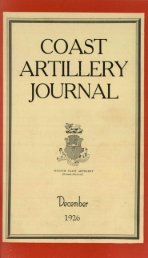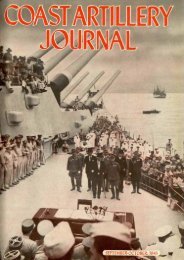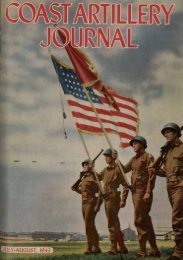Activation of new aaa units - Air Defense Artillery
Activation of new aaa units - Air Defense Artillery
Activation of new aaa units - Air Defense Artillery
You also want an ePaper? Increase the reach of your titles
YUMPU automatically turns print PDFs into web optimized ePapers that Google loves.
-')<br />
1-<br />
FOR YOURSELF-<br />
A complete, convenient indoor<br />
rifle range, and a safe, accurate<br />
target gun.<br />
FOR YOUR FAMILY-<br />
An ideal "training aid"-accurate<br />
shooting and hours <strong>of</strong> fun.<br />
FOR YOUR PARTIES-<br />
An unbeatable crowd-pleaser<br />
-and a real highlight in the<br />
game-room-or the living room,<br />
for that matter.<br />
FOR ALL YEAR ROUND-<br />
The perfect gift-lasting, the<br />
finest kind <strong>of</strong> sport, invaluable<br />
training for hand and eyej safe<br />
for children, more than accurate<br />
enough for the adult sharpshooter.<br />
Johnson Indoor Target Gun<br />
Complete with targets, pellets,<br />
backstop-<br />
$15<br />
EXTRA PARTS<br />
Pellet Carriers $.45 ea.<br />
Propelling Bands<br />
(3 in package) $.40<br />
Pellets (65 to packai:e) , $.'0<br />
Targets S.15 dOL<br />
Order from<br />
Coast <strong>Artillery</strong> Journal<br />
631 Pennsylvania Avenue, N.W.<br />
Washington 4, D. C.<br />
THE COAST AHTILLERY ]OllHNAL<br />
and military power than some <strong>of</strong> his associates.<br />
Hitler's spectacular conquests in 1940<br />
presented acute problems. \Ve were deeply<br />
concerned with preventing the French<br />
Reet from falling into Axis hands and in<br />
maintaining French control over North<br />
Africa. This involved us in tortuous relations<br />
with Vichy France. Perhaps no<br />
other phase <strong>of</strong> our diplomacy has been<br />
more severely criticized, yet Hull thinks<br />
that our policy saved many American lives,<br />
provided valuable information, and made<br />
the successful invasion <strong>of</strong> North Africa<br />
possible.<br />
Hull devotes many chapters to our relations<br />
with Japanese from the fall <strong>of</strong><br />
France to the attack on Pearl Harbor. Our<br />
basic policy as outlined by the President<br />
and Hull in October 1940 aimed at<br />
avoiding a war in the Far East in order to<br />
aid Britain. \Ve were determined to continue<br />
limited aid to China and maintain all<br />
our rights and principles as related to<br />
Japan but not to quarrel with her. And<br />
we would leave the door open for discussion.<br />
Vie had to convey to Japan the impression<br />
that we would use our strength if<br />
necessary. Dealing with Japan on any other<br />
basis reminded Hull <strong>of</strong> the man in Tennessee<br />
whose chivalrous nature prompted<br />
him to unstrap his revolver and leave<br />
it on a stump seventy-five feet away before<br />
engaging in a conference with a highwayman.<br />
\Vhen the Japanese ambassador<br />
protested our program <strong>of</strong> licensing exports<br />
<strong>of</strong> scrap iron and steel in October 1940,<br />
Hull told him abruptly that it wa~ unheard<br />
<strong>of</strong> "for one country engaged in seizing<br />
another country to insist that a third<br />
nation is unfriendlv if it does not cheerfully<br />
provide the n~cessary implements <strong>of</strong><br />
war to aid the aggressor nation in carrying<br />
out its invasion."<br />
Hull was not present at the Atlantic<br />
Charter meeting in August 1941 when<br />
the British and American policy <strong>of</strong> resisting<br />
fu~her Japanese aggression in the Pacific<br />
was agreed upon. His protracted conversations<br />
with Ambassador Nomura began<br />
in March and lasted until 7 December<br />
1941. While these conversations were<br />
going on, a private group including two<br />
<strong>of</strong>ficials <strong>of</strong> the l\laryknoll Mission in Japan<br />
and Postmaster Frank C. \Valker,<br />
raised the old question <strong>of</strong> appeasing the<br />
liberal elements in Japan in order to prevent<br />
the military from going berserk. Hull<br />
was informed <strong>of</strong> these efforts but confined<br />
himself to <strong>of</strong>ficial channels in dealing with<br />
Japan. The Maryknoll episode is another<br />
illustration <strong>of</strong> the futility <strong>of</strong> well meaning<br />
efforts by naive citizens to inRuence the<br />
course <strong>of</strong> action <strong>of</strong> their own government<br />
when they had no real knowledge <strong>of</strong> Japanese<br />
intentions or anv sound basis for<br />
belief that the Japanese- government would<br />
live up to its agreements.<br />
Japan's formal proposals to the United<br />
States showed how far apart our positions<br />
were. According to Hull these called for a<br />
joint overlordship <strong>of</strong> the Pacific by Japan<br />
and the United States, giving Japan con-<br />
]ulr-A/IO/Ist _ b<br />
trol <strong>of</strong> about 90 per cent <strong>of</strong> the popula.<br />
tion and wealth <strong>of</strong> that area. Japan<br />
even suggested that the government <strong>of</strong><br />
the United States refrain from giving aid<br />
to any nation engaged in the European<br />
war. This meant an end to the British aid<br />
program. Japan and the United States<br />
would act jointly to assist in the speedy<br />
restoration <strong>of</strong> peace in Europe. This meant<br />
a peace on Hitler's terms. The United<br />
States was to request China to negotiate<br />
peace with Japan on terms involving the<br />
recognition <strong>of</strong> Japan's possession <strong>of</strong> 1\lanchuria.<br />
This was something we had refused<br />
to recognize ourselves. The United<br />
States was to suspend aid to China in<br />
case Chiang Kai-shek refused to negotiate<br />
with Japan. Normal trade relations would<br />
be restored between Japan and the United<br />
States. Both powers would jointly guarantee<br />
the independence <strong>of</strong> the Philippines<br />
-as if any such action on the part <strong>of</strong> the<br />
United States was necessary. A conference<br />
between Roosevelt and Konoye would<br />
follow the basic agreement.<br />
The differences could not be bridged.<br />
Hull, informed through "magic" <strong>of</strong> Japanese<br />
intentions to submit a deadline date<br />
for our acceptance or refusal <strong>of</strong> the Japanese<br />
terms, did not expect that Japan<br />
would be deterred from warlike acts by<br />
anything short <strong>of</strong> complete acceptance <strong>of</strong><br />
her demands. He looked upon the time<br />
gained in negotiations as time won fO!<br />
our military preparaticns. He warned our<br />
military chiefs as early as November 2;.<br />
1941 that there was no hope <strong>of</strong> reaching<br />
an agreement through diplomatic channels<br />
and that war mu:;t be expected at any<br />
time. He was painfully surprised at the lack<br />
<strong>of</strong> alertness shown by our Pearl Harbor<br />
commanders.<br />
A great debate, already begun, is certain<br />
to rage over t~ question <strong>of</strong> whether<br />
or not the United States could have<br />
reached a modus vivendi with Japan and<br />
prevented the outbreak <strong>of</strong> war in December<br />
1941. l\linimizing the importance <strong>of</strong> Japan's<br />
earlier demands, some writers noW<br />
seem to think that Hull's memorandum <strong>of</strong><br />
November 26, 1941 was the "ultimatum"<br />
that touched <strong>of</strong>f the war. Apparently the<br />
Japanese negotiators in \Vashington had<br />
no such views, because on the day Hu~1<br />
handed them his memorandum, they radIoed<br />
to the Foreign Office in Tokyo the<br />
following intercepted message: "Should we<br />
[Japan] during the course <strong>of</strong> these conversations,<br />
deliberatelv .enter into our<br />
scheduled operation [the Pearl Harbor a:tack],<br />
there is great danger that the r~<br />
sponsibility for the rupture <strong>of</strong> the neg oU -<br />
ations will be cast on us. There ha\'e ~ed<br />
times in the past when she [the UnH<br />
States] could ha\'e considered discontinuing<br />
com'ersarions because <strong>of</strong> our in\'a sion<br />
<strong>of</strong> French Indo-China. Now, should wewithout<br />
clarifying our intentions, force a<br />
rupture ... she may use such a thing ~<br />
that as counter propaganda against us..<br />
On the dav Hull handed his so-called ulumatum<br />
to' the Japanese envoys in \Vas~ington,<br />
a Japanese naval task force <strong>of</strong> SL\7



